AVIVA-Berlin >
Women + Work > Lokale Geschichte_n
AVIVA-BERLIN.de im Januar 2026 -
Beitrag vom 05.12.2013
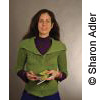
I love it here
Adi Liraz
A portrait by Adi Liraz of Mai Zeidani Yufanyi, born 1983 in Calandia to a Palestinian father and an Israeli mother. The political activist, academic and cosmopolitan chose Berlin as her hometown
Mai Zeidani Yufanyi, sociology and political science Master student, mother to Karim and Alya, wife to Mbolo, lives in Berlin-Neukölln since 2005.
I first met Mai when I was producing a project by the name: ´Heimweh´ which dealt with themes of identity and belonging. Mai´s best friend is also Israeli and is married to my cousin. When Mai and I first met, she was near the end of her pregnancy, bearing her first child, her son Karim. Since then, Mai has participated in another one of my art projects, near the end of her second pregnancy with her daughter, Alya. While we are having this interview, Alya is only three weeks old.
The interview takes place at Mai´s home: her apartment, not far from Hermannstraße S+U-Bahn station. Just like when we first met, it is now winter and I am walking through the streets with my heavy coat, trying to find the right street and then the right house number. Since the first time when we met, I now feel more comfortable entering her home, as I have already been here on a few occasions, sometimes with my own family, and Karim, Mai´s son, can recall me from the day before, when we were celebrating Hanukkah together.
Mai was born in 1983, in Calandia (a small Palestinian village creating the urban continuum between Jerusalem and Ramallah), to a Palestinian father and an Israeli mother, and grew up in Jerusalem. She moved to Berlin in 2003, when she was only 20 years old, and has lived here ever since.
Mai tells me: "When I was seventeen, I went to a European trip for ten months, and had friends all over Europe that I could crash on their sofas. Except in Berlin. Here I did have one friend, but on his sofa I couldn´t crash, so I went to a hostel. It was November and it was rainy, I had a cold and was most of the time alone, but still I loved the city, so I thought this would be a good place to live in. Initially, my best friend, who has a German passport, and I had a plan to migrate here together. Since she is four years older than me, she was supposed to move here first, but then I did, and she stayed in Israel/Palestine. In addition to that, Berlin had many good film schools and at that time this was what I thought I was interested in."
After working in the Film industry for a very long time, the Jerusalem ´Cinematheque´ and on several productions of the Jerusalem based ´Sam Spiegel´ Film School, Mai felt that she does not like the Israeli industry, and decided to leave to Berlin. But then, after a while in Berlin, trying to get into different film productions and doing some editing jobs, she realized that what she actually did not like was the film industry itself.
"But the move here was definitely supported by the shitty political situation in Israel. For me, as someone having both Israeli and Palestinian roots", says Mai, "identity and belonging has always been for me an extremely complex issue".
Mai did not move to Neukölln upon arriving in Berlin. She first lived in Lichterfelde West with a gay couple who were friends with her grandparents. "They were two men who you could notice never lived with women, but they were very nice". One of them was a Theater artist from the GDR who could not speak English, the other one, a painter, could speak English and was the only communication channel. The deal was that Mai would stay there and help with the house hold and cleaning and would not pay rent. She lived there for about a month, but decided to leave because of the distance to the city and the lack of privacy, since her room was also the Studio of the painter.
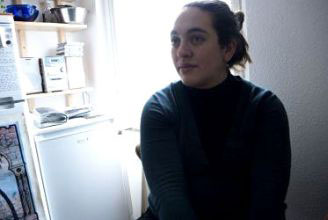
"I had some friends in Kreuzberg", tells Mai, "in one of their parties I met a girl that wanted to sublet her apartment in Prenzlauer Berg, so I took it. Again only for one month, a studio apartment with no shower, and toilet in the staircase, and a coal heating, and I didn´t know how to operate it properly, so I had a very cold winter. And only later did I understand that I didn´t operate it properly. Then I lived one month in Grünewald, together with very good friends. Then I moved to Bismarck Straße, where a friend of mine from Turkey was also living. We were studying German together. In this apartment I lived the longest time this year (2004), six months long".
Mai continues: "Finally I found myself in Friedrichshain, and this is where my political activism started, which later became a significant part of my life and what I am today mostly occupied with".
Mai was visiting the collective language school ´Babilonya´ at the time and on one occasion went to an event organized by them, where they showed the film ´Arna´s Children´ of Juliano Mar Hamis (a famous Palestinian-Israeli artist, director and leftish activist who was killed a few years ago). There, Mai met her future roommates: Ahmad from Jenin and Miri from Petah Tikva. Ahmad was an activist of ´The VOICE´ organization and invited her to a meeting of the ´Plataforma´: a collection of student migrants, refugees and migrants without any kind of legal status that got together to fight against racism and discrimination, but most importantly a platform for self empowerment and self determination. They where held at first in the squatted house in Liebigstraße. Mai notes: "It was the first time I have found a political home"
Mai continues: "What was nice about this group is that it was a real platform of migrant resistance. Migrant means refugees but as well students and people with migrant background. We did not define ourselves as anti racist, as you usually would hear from German groups. I always felt not belonging in any other group (Israeli, German, or Palestinian). But in this group, there was no need of ethnicity, we were all migrants and as such we were fighting for our lives. I found my identity identifying myself as a migrant".
Each one of the members of the ´Platforma´ was revealing the political and social situation in his/her own country, the different conflicts and reasons to leave his/her home, and how his/her actions in Germany are only a part of his/her activism and fight in his/her own country. "We were discovering a link between all of our fights in these different countries and at the same time were resisting the German system of oppression and pointing out to its contribution and support of these regimes in our home countries either by delivering weapons or supporting financially and politically", adds Mai.
After a while, the meetings of the ´Platforma´ group moved to Adalbert Straße number six, in the area of Kottbusser Tor, Kreuzberg, at the ´A6 Laden´. They had regular weekly meetings and events, where they were screening films, organizing lectures, and bringing together human rights activists from different places, such as an activist from Togo, a black writer from England, and lawyers who could consult how to solve legal conflicts of the kind they encountered as migrants. Mai adds: "We also went to refugee camps sometimes, with lawyers to offer consultation, but in such a way that people had to take action and know that they can take action, know that they can take care of themselves and have the power to do so through these consultations"
Mai notes that the political activism became a central and important part in her life especially after the death of the black refugee Oury Jalloh. He was a Sierra Leoner living in Germany, and was killed by a fire in the German police station in Dessau. Mai elaborates: "We were demonstrating and going into court, trying to reveal what happened to him. We were much occupied with the trial and trying to prove that it was a murder and not a suicide"
But there were many other groups meeting at the ´A6 Laden´ at Adalbertstraße, the landlord wanted all of them out and in the end, after a year or two, they were asked to leave and evacuate the store. Additionally to that, the group had also fallen apart for other reasons and, as Mai notes: "This group took over our lives and then disappeared because some people left and there were some conflicts. Right now, only three of us are still in Berlin, and we are all busy with our families and our children at the moment. The circle of life of political action, we get together and then it dissolves. But there are other groups coming together now..."
However, Mai has continued her activist life through different channels, and it has become as well a part of her personal life. Mai recalls: "I lived with Ahmad, Miri and her partner Indru in Neukölln, Karl Marx Straße. There I met Mbolo, my husband". Mbolo is a migrant too, from Cameroon, and is also, like Ahmad, part of the group ´The VOICE´ refugee forum, which is a strong member of the ´Karavane´, an umbrella organization for self organized migrants.
Mai tells: "I first really noticed Mbolo when he came to visit some friends of mine from the ´Plataforma´, they where living in the second floor of the building where I lived in, and we went together dancing in the ´A6 Laden´ ". A couple of weeks later, Mai went to present a film about Oury Jalloh´s death in Göttingen, an event which was organized by Mbolo.
Mai: "This was April 2006 and since then we are together".
Two years later, when Mbolo finished his Masters studies, he moved to Berlin, and for one year longer, they lived in the same commune where Mai was living before, until they moved to the house where they live now. This house is where Karim and Alya were born and where this interview takes place, at Schiller Kietz in Berlin-Neukölln.
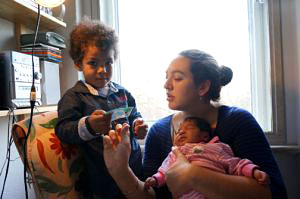
A: "What makes Neukölln your home?"
M: "I spent all of my adult life in Berlin. I never rented an apartment or opened a bank account in Israel. I learned how to be an adult in Germany. Berlin is for me much of a home as Jerusalem was, if not more.
Neukölln is where I spent eight of these ten years. This is the place I love most in Berlin. I love the people and I love the way the streets move. That it is not as German as Charlottenburg, for example, but this is Germany. Most of the people here were born in Germany and are German, this life is German but it is not what somebody from the outside would expect of Germany. But for me, this is Germany. Here, I can find anything I want, from food and music and good coffee.
I benefit from processes of the gentrification which are happening around me and which I have to admit that I am a part of, because I am not the typical low education and low income migrant. But it should be obvious that I am against any kind of expulsion mechanism. And very critical towards policies that support gentrification".
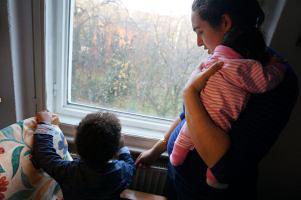
A: "What makes you feel belonging here?"
M: "The time and space. It´s where my children were born. It´s where I got married and found my love. I love it here. I walk on the street and say ´Good morning!´ to the people who I see, the hairdresser, the people from the afro salon, the guy who sells phones, I feel safe and I feel like its mine. I feel comfortable. It´s something that you acquire. As home is something you acquire, you build for yourself. I might move away to a different place and in ten years it will also be my home. I am not married to the place, but this is where I have built my home"
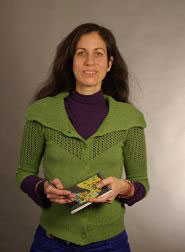
Adi Liraz, born in Tel Aviv, 1976, is an interdisciplinary artist, curator and art producer, works and lives in Berlin since March, 2003 with her partner and two children. The main themes in her work are feminism/postfeminism, craftivism, migration, and urbanism, these are often expressed by intimacy vs. public space. The aim of Adi´s creation is to instigate communication and exposure through provocation of hegemonic perceptions. Adi holds a BFA from the ´Bezalel academy of Art and Design, Jerusalem´ (2001), and a M.A. In Space Strategies, art in public context, from the ´Art Academy Berlin Weißensee´ (2013). More of her work can be seen at adiliraz.jimdo.com and the Ring knitting Circle on Facebook.
© Foto von Mai Zeidani Yufanyi: Adi Liraz
© Foto von Adi Liraz: Sharon Adler
Gefördert durch




Kooperationspartner

Agentur fĂĽr Arbeit Berlin-Brandenburg
